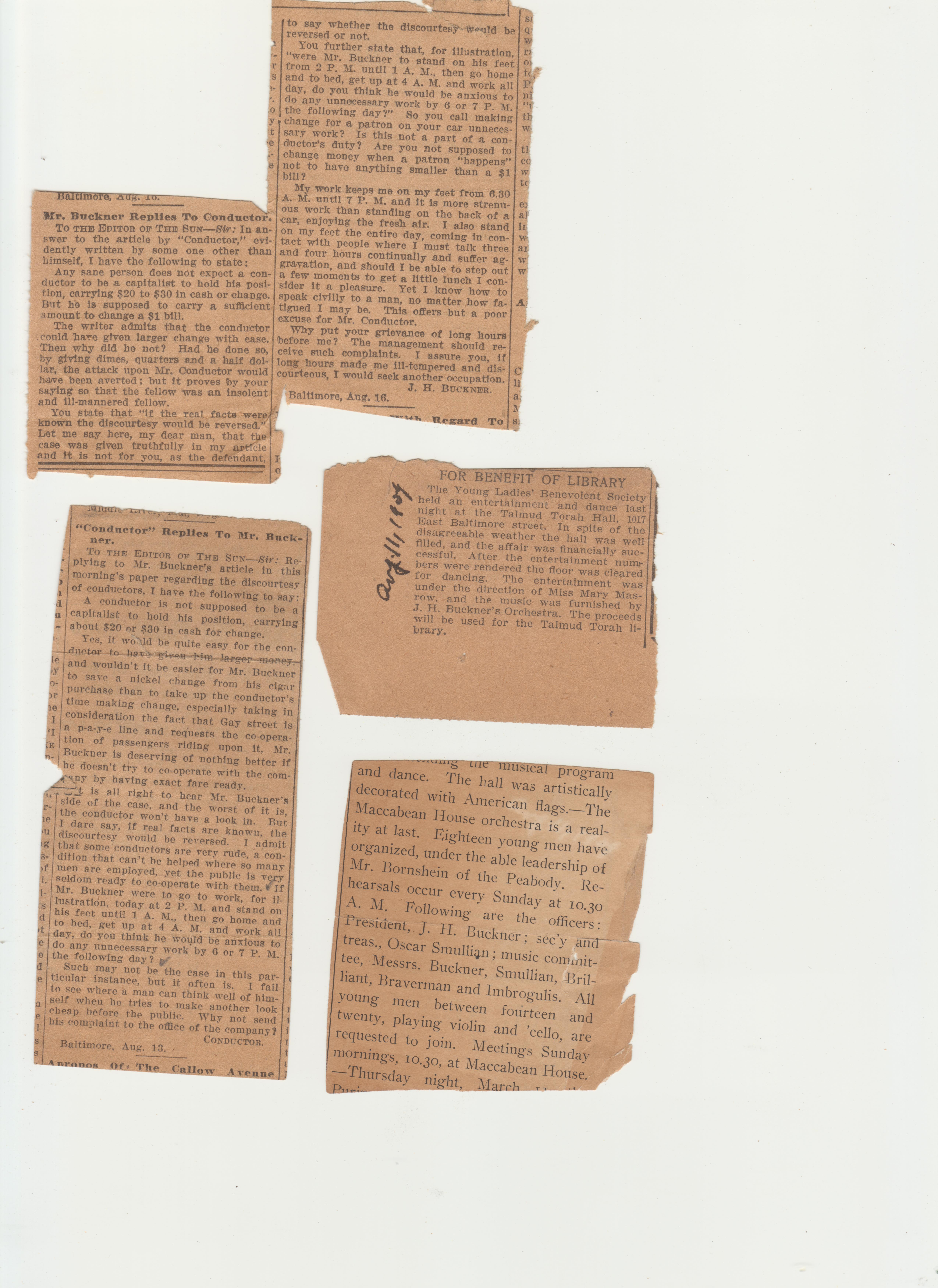Jacob H. Buckner and the 1914 Conductor Dispute + Musical Endeavours
 This collection of articles and cuttings provides rich insight into the public life and civic engagement of Jacob H. Buckner in 1914 Baltimore. It serves both as a personal snapshot and a broader socio-cultural commentary.
This collection of articles and cuttings provides rich insight into the public life and civic engagement of Jacob H. Buckner in 1914 Baltimore. It serves both as a personal snapshot and a broader socio-cultural commentary.
Key Themes and Significance:
- Civic Dispute with Streetcar Conductor:
- This public debate between Buckner and a streetcar conductor, featured prominently in the Baltimore Sun letters section, shows Buckner’s outspoken and principled stance on everyday injustices.
- The tone of Buckner’s letter is pointed but articulate, indicating both frustration and civic awareness.
- He challenges the treatment of standing passengers and fare issues—foreshadowing broader public transit equity issues that became central to American urban reform.
- Buckner’s Cultural Leadership:
- As president and organiser of musical societies, Buckner was clearly deeply embedded in the Jewish communal and cultural fabric of early 20th-century Baltimore.
- His involvement in the Talmud Torah library fundraiser, entertainments, and the Maccabean House Orchestra demonstrates leadership, musical ability, and organisational skills.
- The references to Miss Mary Wasserman, the Young Ladies’ Benevolent Society, and the Peabody Conservatory show a thriving network of youth culture and philanthropy in Baltimore’s Jewish community.
- Social Commentary & Generational Insight:
- The complaints and counterpoints over conductors and streetcars reflect class tensions, expectations of customer service, and the frustrations of everyday working men in the early 1900s.
- Buckner positions himself not just as a critic, but as a voice of the young professional Jewish man navigating modern urban life.
- Age and Activity:
- Based on Buckner being active in youth musical organisations and writing passionate letters to the editor, it is likely he was in his early 20s at this time (circa 1914).
🖋️ FULL TRANSCRIPTIONS
Top Left — Mr. Buckner Replies to Conductor
Baltimore, Aug. 16.
Mr. Buckner Replies To Conductor.
To the Editor of The Sun—Sir: In answer to the article on “Conductors,” evidently written by some one other than the conductor, I have the following to say:
A conductor is not to be excused because he happens to be an exploitator to hold his position. For $2.30 he can hold his job, carrying a register which is worth several times more to the company.
The writer admits that the conductor was discourteous, and gives the evidence by which this is proven. Now what more is to be said in his defence? How did he do so, then, say do his best? Had he done so, there would be no complaint. But as your eyes have shown the facts, and as a burden of these facts have not borne out the denial of the defendant, I say that your own eyes have arrested it. It proves by your own admission that he was discourteous and rude, and no excuses will make it other than a cowardly and ill-mannered fellow.
Even the discourtesy was increased when his lie was added. The fare was not refused. He simply said “Have you change?” That is all that is necessary for any article and it is not for you, as the defendant, to say whether the discourtesy would be reversed or not.
You further state that, for illustration, I, Mr. Buckner, had to stand on his feet from 2 P.M. to 11 A.M., then home at 2 A.M., and up at 4 A.M. and work all day, do you think he would be anxious to be annoyed by you?
Why do you think that I follow a position of unnecessary work? Is this on your part unnecessary work? Do you think I have no complaints or that I am the only man who has nothing smaller than a $5 bill?
The work keeps one on their feet from 6 A.M. to 11 P.M. Is this not a more strenuous work than the standing of a short trip on the line? The axiom “No rest to the wicked” comes home. All these men and people where I meet daily are courteous, humble and faithful; and I try to be so myself.
I smile a little bit more, and that makes others smile. I call it a pleasure. Yet I know how to condemn a person who meets me by looking on me as though I was not better or worse than dirt.
Forget your grievance of long hours and seek your compensation in good manners. I would see it ill-tempered and discourteous, and would see such persons fired.
— Yours, J.H. BUCKNER.
Top Middle — Conductor Replies to Mr. Buckner
Baltimore, Aug. 15.
“Conductor” Replies To Mr. Buckner.
To the Editor of The Sun—Sir:
Referring to Mr. Buckner’s article in this morning’s paper regarding the discourtesy of conductors, I have the following to say:
A conductor is not supposed to be discourteous. He is expected to hold his position, carry cash, give change, protect his passengers and his life, and register his fares.
But I take up the conductor’s case as well. Why do passengers expect that conductors must be cheerful, bright, attentive and civil for $2.30 a day? Is it not a bit easier for Mr. Buckner to pass a nickel than for this elegant gentleman to take up the conductor’s time making change, especially taking inconsiderate line rates that get steep?
I don’t blame conductors for this. If Mr. Buckner is deserving of sympathy, then the conductor is deserving of nothing better.
Buckner pays 5¢ to co-operate with the system. He ought to expect return.
It is all right to have Mr. Buckner’s reform, but not at the cost of common sense. If he is too fine a fellow to carry fare coins, then let the system bear the burden.
If a man has travelled for 10 hours a day, being spat on, climbed over, insulted, then explored, yet the public is my friend! You expect gentlemen to work 17 hours a day, from 4 A.M. to 9 P.M., and to meet ill tempers, and still be friendly? Ask too much of us and we’ll fail.
I, too, say we must keep the system friendly. But don’t think the man who works 17 hours a day without relief will smile at every impatient gentleman.
— Yours, A Conductor
(Callow Avenue)
Top Right — For Benefit of Library
April 11, 1914
FOR BENEFIT OF LIBRARY
The Young Ladies’ Benevolent Society held an entertainment and dance last night at the Talmud Torah Hall, 3017 East Baltimore Street. In spite of the disagreeable weather, the hall was well-filled, and after the entertainment the greater part of the audience remained for dancing. The entertainment was under the direction of Miss Mary Wasserman, and the music was furnished by J. H. Buckner’s Orchestra. The proceeds will be used for the Talmud Torah Library.
Bottom Right — Maccabean House Orchestra
The musical program was decorated with American flags. —
The Maccabean House orchestra is a reality at last. Eighteen young men have organized, under the able leadership of Mr. Bornshien of the Peabody.
Rehearsals occur every Sunday at 10.30 A.M. Following are the officers:
President: J. H. Buckner;
Secretary and treasurer: Oscar Smullian;
Music committee: Messrs. Buckner, Smullian, Brilliant, Braverman and Imbroglini.
All young men between fourteen and twenty, playing violin and ’cello, are requested to join.
Meetings Sunday mornings, 10.30, at Maccabean House. —Thursday night, March— (cut off)
